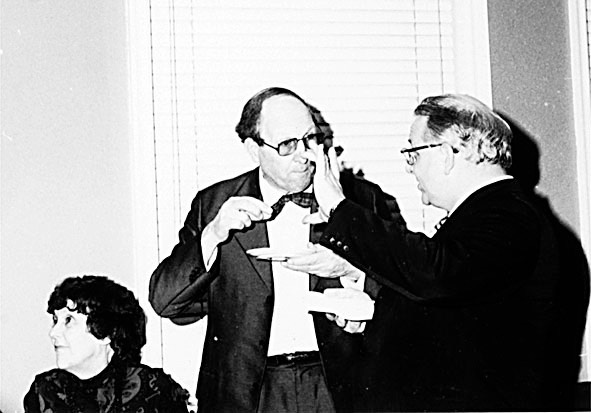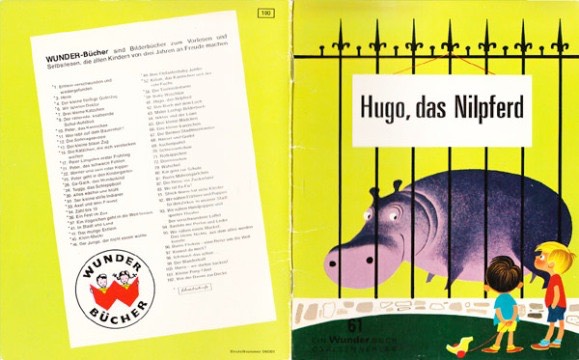My grandfather died a few weeks ago, aged eighty-eight. My three other grandparents have been gone a long time: my mother’s parents died nearly thirty years ago, within a few months of each other despite being nine years apart in age (I have written about their wedding as described in my grandmother’s diary: see In praise of the handwritten word); and my paternal grandmother died when I was doing my A-levels (I missed her funeral because of them). My grandfather has also, in many ways, been absent for some time, his mind having gone on ahead, if I can put it like that.[1]
I find it very difficult to think about Grandted in isolation. Thinking about my grandfather also means thinking about my father, who is so like (and yet so unlike) him. For example, my father cares enormously about his physical fitness, whereas my grandfather was overweight for as long as I can remember. When I was a child, Grandted, with his few remaining teeth and enormous bulk, reminded me of Hugo das Nilpferd, the eponymous hippopotamus hero from a wunderbucher that we had read to us as children; we never learnt to read it for ourselves as neither of us had much of an ear for German, so all my memories of the book consist of the illustrations only, showing Hugo, huge and mauve, in various predicaments.[2]
Hugo, das Nilpferd
My father is entirely un-Hugo-like: (spoiler alert!) he is not mauve and, to my knowledge, has never got stuck in a bath or mistaken a piano for a crocodile. He is also physically compact, dense and muscular, rather like a bantam. In his capacity as Grandted’s eldest child, and supposedly the most comfortable with public speaking, my father gave the eulogy at Grandted’s funeral. He described this as a cathartic experience, and no doubt it was; the most striking thing about it for me, however, was how much of what Dad presented to us was new information. How little Grandted talked about himself and his work. Why did my brother and I always call him Grandted, for example? My father provided the answer here, writing as follows:
[Ian] didn’t much fancy G’father, G’pa or G’dad, I think because of his own faintly remembered past (but, I wonder, did he have opportunity to know either of his own grandfathers?). He liked one or both of you (it was probably you, Jess) referring to him as a big Teddy Bear[3] hence the suggested contraction to GrandTed. Naturally [Mother] and I (but mostly me) were tickled at him being ‘taken for GrandTed’, so we perpetuated what was probably, initially, only going to be a passing label.
Why did he use his middle name (Ian) when his first name is Hubert? Both Ian and Ian’s parents were quite clear that he was to be known as Ian, so why bother with Hubert at all? Does my father get his habit of referring to everyone by initials from Ian, or is that all his own?[4] Dad maintains this is an academic habit, and yet none of the academics I work with now seem to have it. Why was Ian so insistent about lunch coinciding with the one o’clock pips? Even his memorial lunch made note of this:
The date [May 13th] would have amused Ian as he was super-rational rather than superstitious; the time [1230] less so, as at home he insisted firmly that lunch start with the one o’clock time signal.
Ian was a lecturer at the University of Newcastle (or King’s College Durham, as I think it probably was when he first joined) in computing science and maths. My father is a mathematician, and yet it is only in the last few weeks that Dad has actually found and read Ian’s seminal paper[5]; nobody in the family has a copy of his thesis and Dad is the only one who remembers ever discussing it with him.[6]

Ian (right), probably in 1997 celebrating the fortieth birthday of his Department. I found this captioned ‘And at the KDF9 party the drinks were *that* big!’
I’ve discovered recently at choir that one of my fellow tenors and I have no overlap whatsoever in our musical tastes: each announcement of a new piece draws a groan from one and a small cheer from the other, but never the same reaction from both. By contrast, my father and I seem to agree almost universally on our favourite hymns. Dad had several things to say about his father in the eulogy (particularly his formidable reputation as a teacher) that could equally have been said about my father, that I fully expect to repeat in my own eulogy for my own father in about thirty years, and that I hope could and will be said about me when the time comes. No doubt we will repeat at least one of the hymns too, as I note they included two of our favourites: ‘Dear Lord and Father of Mankind’, with its supremely comforting, swirling tune; and ‘Praise My Soul the King of Heaven’. The line I have used as the title for this post is from the third verse of the latter hymn, which is often sung by female voices only. That verse always reminds me (although these memories are very old and necessarily dim) of Dad handling a pipistrelle he had found in the kitchen: ‘In His hands He gently bears us / Rescues us from all our foes’, which in this case would be the cats.
Another mutual favourite with a fatherly flavour is ‘Eternal Father Strong to Save’. Researching it online, I discovered that the words were written long before the tune, in response to both a near-miss on the high seas for William Whiting (who wrote the words) and a conversation some years later with a student of his about to embark for America and understandably nervous of the ocean voyage. What a beautiful, mournful tune this hymn has! As with so many hymn tunes, even those associated primarily with one set of words only, the tune has its own name (Melita).[7] Dad and I have played and sung this hymn together many times. My strongest memory of singing this hymn is from a lifeboat service; these are usually held in the summer in Cornwall, and every one I’ve been to has included this hymn. On the most memorable occasion, I was with my mother, and we stood on the cliffs at Boscastle to sing a variety of hymns, including ‘The Old Rugged Cross’, much to Mum’s disgust. She didn’t often express hatred of specific things out loud, but if she had been forced to make a list that summer, I think it would have included caraway seeds, the colour blue, spending time with me and my father, and ‘The Old Rugged Cross’. We followed this with ‘Guide Me O Thou Great Jehovah’, which we sang with such vigour that a harbour seal who had popped up to see what we were doing decided the sea wasn’t so bad after all and swam off in a tremendous hurry.
‘Eternal Father Strong to Save’ was the final hymn at the lifeboat service, after the names of and prayers for those who had died at sea that year had been read. There was a sizeable crowd on the cliffs, many openly weeping as we sang (‘Oh, hear us when we cry to Thee / For those in peril on the sea’). My father, who never cries[8], describes it as ‘easy to cry to’, and he’s right: hymns (particular old, familiar ones) have a way of expressing emotions we otherwise might not be able to describe. ‘Praise My Soul’ contains a line that captured Grandted’s funeral well for me, watching Dad wrestle manfully with grief, relief and the eulogy all at once: ‘Praise Him for His grace and favour / To our fathers in distress’.
[1] I discovered while searching for Ian’s paper online that my uncle Colin has set up a fundraising page to allow donations to Alzheimer’s Research in Ian’s memory.
[2] Nilpferd meaning ‘horse of the Nile’, as opposed to the Greek word hippopotamus, meaning ‘horse of the river’. We shorten it to ‘hippo’, which just means ‘horse’ and therefore makes no sense.
[3] Regular readers might recall that I also refer to my husband as Giant Bear. I can only suggest that Big Ted has a lot to answer for.
[4] My father has, for as long as I have been receiving emails from him, signed them (and indeed all personal communication, including birthday cards) with his initials.
[5] G.S. Rushbrooke and H.I. Scoins, ‘On the theory of fluids’, Proceedings of the Royal Society (January 1953), vol. 216.
[6] To misappropriate Hamlet, we didn’t really know him, Horatio.
[7] Melita is an old name for Malta; Malta was the site of a shipwreck (St. Paul was aboard) described in the Book of Acts, Chapter 27, and so perhaps this is how the hymn-tune acquired its name.
[8] What, never? No, never? What, never? Well … hardly ever!

